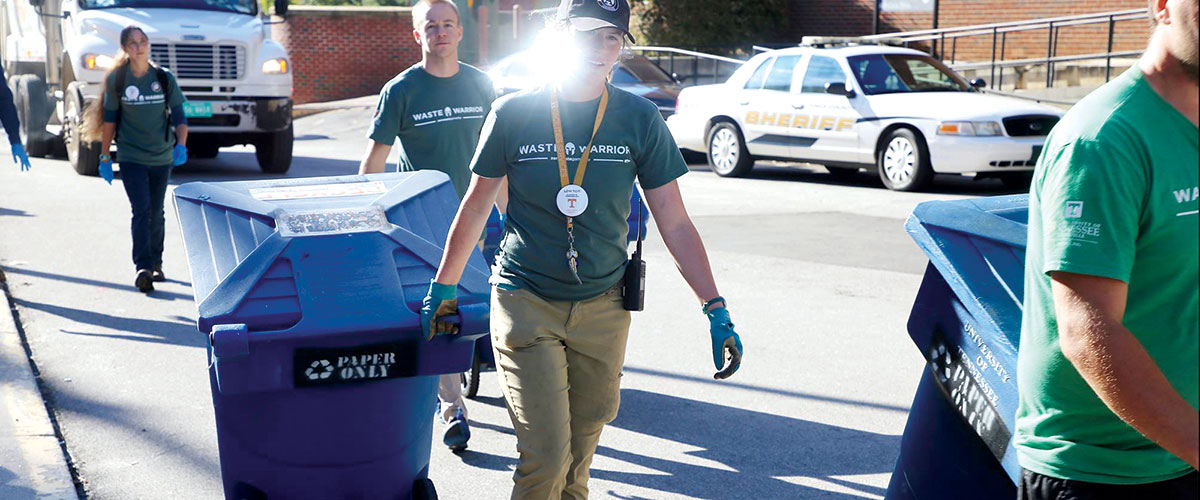
“For us, recycling and our zero-waste goals at UT are about so much more than simply keeping waste out of the landfill. Our mission is to maximize the value of the resources that come to campus and engage others, especially students, in assessing and solving resource allocation issues right here on our campus.” —Jay Price, Sustainability Manager
RECYCLING STATS
FY 2023
4,473
tons recycled/ composted/ donated during FY 2023
31.7%
diversion rate
130
students volunteered for zero-waste game days
33
team members
RECYCLED MATERIALS
FY 2023
Recycled materials make money for the university.
$12,917.75
Wooden pallets
$1,221.80
Mixed paper
$23,321.65
Cardboard
$10,936
Sorted office paper
$7,196.27
Scrap metal
$1,380.57
Cooking oil
Source: 2018-19 Environmental Impact Report
Those needing recycling assistance on campus should submit requests via DASH by filling out a work request and selecting “Recycle” as the type of problem. When filling out this form, please be as detailed as possible.
The services that we can provide include, but are not limited to, the following:
- Office Clean Outs
- Material Pick Ups
- Bin Requests
- Zero Waste Events
If you can not submit a request via DASH or have any questions, please email recycle@utk.edu or call 865-974-4945.
Why Recycle?
Find out what we recycle and where we do it.
Aluminum
![]() Throwing away a single can is like pouring out six ounces of gasoline. Creating a can from recycled aluminum uses 95 percent less energy than creating one from virgin materials.
Throwing away a single can is like pouring out six ounces of gasoline. Creating a can from recycled aluminum uses 95 percent less energy than creating one from virgin materials.
An aluminum can has no limit to how many times it can be recycled, and the average life cycle of a can is under 60 days.
Plastics
![]() Creating new plastics accounts for seven percent of worldwide usage of fossil fuels.
Creating new plastics accounts for seven percent of worldwide usage of fossil fuels.
The purpose of plastic containers is to be chemically inert to the material it contains, which makes them virtually non-biodegradable. Thus, plastics continue to pollute surface waters and break into smaller and smaller pieces. They eventually end up in the oceans, where large eddy currents collect and concentrate the debris, affecting sea life.
Cardboard
![]() About 90 percent of all products shipped worldwide are shipped in cardboard containers. As it is a paper product and there are a limited number of trees, recycling cardboard is not only lucrative but essential to maintaining an environmental equilibrium. Recycling cardboard saves 50 percent of greenhouse emissions compared with new cardboard.
About 90 percent of all products shipped worldwide are shipped in cardboard containers. As it is a paper product and there are a limited number of trees, recycling cardboard is not only lucrative but essential to maintaining an environmental equilibrium. Recycling cardboard saves 50 percent of greenhouse emissions compared with new cardboard.
Food Waste
![]() Organic materials in landfills break down under anaerobic conditions. In the absence of oxygen, bacteria will produce methane gas more readily. Methane is a greenhouse gas with 20 times more greenhouse potential than carbon dioxide. Also, organic materials take up valuable space in landfills. At the University of Tennessee, we compost green wastes and food wastes to create a nutrient-rich soil additive.
Organic materials in landfills break down under anaerobic conditions. In the absence of oxygen, bacteria will produce methane gas more readily. Methane is a greenhouse gas with 20 times more greenhouse potential than carbon dioxide. Also, organic materials take up valuable space in landfills. At the University of Tennessee, we compost green wastes and food wastes to create a nutrient-rich soil additive.
Steel Cans
![]() Most people call them “tin cans,” but the containers your green beans come in are mostly made of steel. Recycling steel cans saves 74 percent of the energy used to produce them. A steel mill that uses recycled scrap reduces related water pollution, air pollution, and mining wastes by about 70 percent.
Most people call them “tin cans,” but the containers your green beans come in are mostly made of steel. Recycling steel cans saves 74 percent of the energy used to produce them. A steel mill that uses recycled scrap reduces related water pollution, air pollution, and mining wastes by about 70 percent.
E-waste
![]() Electronic waste is a rapidly growing constituent of the waste stream. It contains many valuable recoverable metals and toxic and hazardous materials.
Electronic waste is a rapidly growing constituent of the waste stream. It contains many valuable recoverable metals and toxic and hazardous materials.